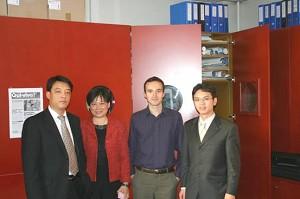PARIS–In a recent interview by the Reporters Without Borders, two defectors from the Chinese Communist Party (CCP) gave insiders’ information about the CCP’s infiltration, control, and manipulation of the media in China and overseas, including its operation of the Internet blockade.
On October 25, 2005, Vincent Brossel, chief of Reporters Without Borders's Asia-Pacific Desk, interviewed Chen Yonglin and Hao Fengjun at its Paris headquarters. Hao formerly was a police officer of China’s 610 Office, the Gestapo like organization responsible for persecuting Falun Gong and other dissidents. Chen was the Consul for Political Affairs in the Chinese Consulate in Sydney. They both defected from the CCP early this year in Australia.
Mr. Brossel applauded Chen and Hao for their courage in exposing the CCP. Hao expressed admiration of the Reporters Without Bordersstaff working in China. As a former officer for the National Security Bureau, Hao knows these personnel are constantly under tight surveillance by the CCP’s secret agents once they set foot in China.
Chen and Hao stated that the CCP’s main objective is to manipulate the world’s media to its advantage. Their targets are both Chinese and Western media. The CCP accomplishes its goal in several ways, they said. It invests in overseas media it already controls, supporting media friendly to the CCP. It uses Party officials, spies and other special relationships, in order to draw in, bribe, influence and infiltrate objective media. Moreover, the CCP systematically attacks and ruins media who choose to report objectively on major issues and expose the CCP’s evil principles and tactics. It uses defamation and espionage, sows dissension, and attempts to block such media’s dissemination.
Chen explained that it is customary for the CCP to lie and spread false propaganda to the general public through the media. For instance, Europe originally hoped that through economic cooperation with China, the growth in the economy would foster democracy in China and allow the Chinese people to enjoy more freedom. However, the CCP quoted an official statement to that effect out of context and broadcast nationwide that Europe hopes to strengthen China.
Hao focused on discussion of the CCP’s obstruction of information dissemination in China through the Internet blockade. The facts and truth such as the arrest of pro-democratic leaders, religious group leaders and people who have resigned from the CCP and its affiliated organizations are not allowed to reach the general public. Hao revealed that the Tianjin City Police Bureau alone, not including its 18 sub-bureaus, had more than 60 Internet police. These Internet police specifically target those with the ability to bypass the national firewall. Once identified, these individuals’ names are submitted to public security offices for arrest.
Hao mentioned that the CCP was greatly alarmed by the Nine Commentaries on the Communist Party published by The Epoch Times. At the end of 2004, a national conference was held in preparation of launching a campaign against those who have resigned from the Party. Tianjin each day arrested 20 to 30 people who declared their resignation on The Epoch Times Tuidang (Quit the CCP) web site, from November 2004 to February 2005. These people were at all levels of society, including Falun Gong practitioners. Mr. Brossel was startled by the striking number of arrests.
Hao Fengjun and Chen Yonglin both said they would keep in contact with Reporters Without Borders and continue to strive for democracy and freedom in China.


